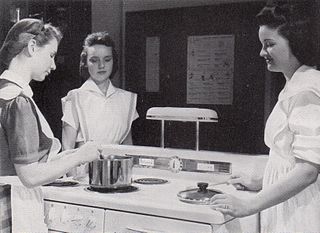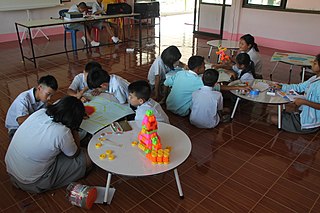The Reggio Emilia approach is an educational philosophy and pedagogy focused on preschool and primary education. This approach is a student-centered and constructivist self-guided curriculum that uses self-directed, experiential learning in relationship-driven environments. The programme is based on the principles of respect, responsibility and community through exploration, discovery and play.

Experiential education is a philosophy of education that describes the process that occurs between a teacher and student that infuses direct experience with the learning environment and content. The term is not interchangeable with experiential learning; however experiential learning is a sub-field and operates under the methodologies of experiential education. The Association for Experiential Education regards experiential education as "a philosophy that informs many methodologies in which educators purposefully engage with learners in direct experience and focused reflection in order to increase knowledge, develop skills, clarify values, and develop people's capacity to contribute to their communities". Experiential education is the term for the philosophy and educational progressivism is the movement which it informed. The Journal of Experiential Education publishes peer-reviewed empirical and theoretical academic research within the field.

In education, a curriculum is broadly defined as the totality of student experiences that occur in the educational process. The term often refers specifically to a planned sequence of instruction, or to a view of the student's experiences in terms of the educator's or school's instructional goals. A curriculum may incorporate the planned interaction of pupils with instructional content, materials, resources, and processes for evaluating the attainment of educational objectives. Curricula are split into several categories: the explicit, the implicit, the excluded, and the extracurricular.

Experiential learning (ExL) is the process of learning through experience, and is more narrowly defined as "learning through reflection on doing". Hands-on learning can be a form of experiential learning, but does not necessarily involve students reflecting on their product. Experiential learning is distinct from rote or didactic learning, in which the learner plays a comparatively passive role. It is related to, but not synonymous with, other forms of active learning such as action learning, adventure learning, free-choice learning, cooperative learning, service-learning, and situated learning.

Project-based learning (PBL) is a student-centered pedagogy that involves a dynamic classroom approach in which it is believed that students acquire a deeper knowledge through active exploration of real-world challenges and problems. Students learn about a subject by working for an extended period of time to investigate and respond to a complex question, challenge, or problem. It is a style of active learning and inquiry-based learning. PBL contrasts with paper-based, rote memorization, or teacher-led instruction that presents established facts or portrays a smooth path to knowledge by instead posing questions, problems, or scenarios.
The International Baccalaureate Middle Years Programme (MYP) is an educational programme for students between the ages of 11 and 16 around the world as part of the International Baccalaureate (IB) continuum. Middle Year Programme is intended to prepare students for the two-year IB Diploma Programme.
International education refers to a dynamic concept that involves a journey or movement of people, minds, or ideas across political and cultural frontiers. It is facilitated by the globalization phenomenon, which increasingly erases the constraints of geography on economic, social, and cultural arrangements. The concept involves a broad range of learning, for example, formal education and informal learning. It could also involve a reorientation of academic outlook such as the pursuit of "worldmindedness" as a goal so that a school or its academic focus is considered international. For example, the National Association of State Universities prescribes the adoption of "proper education" that reflects the full range of international, social, political, cultural, and economic dialogue. International educators are responsible for "designing, managing, and facilitating programs and activities that help participants to appropriately, effectively, and ethically engage in interactions with culturally diverse people and ideas."
An international school is an institution that promotes education in an international environment or framework. Although there is no uniform definition or criteria, international schools are usually characterized by a multinational student body and staff, multilingual instruction, curricula oriented towards global perspectives and subjects, and the promotion of concepts such as world citizenship, pluralism, and intercultural understanding. Many international schools adopt a curriculum from programs and organizations such as International Baccalaureate, Edexcel, Cambridge Assessment International Education, International Primary Curriculum, or Advanced Placement.
The Ashgabat International School is an international school in Ashgabat, Turkmenistan. It is a private, non-profit day school which offers an educational program from a 3 to 4 year old program through high school for students of all nationalities. High school students may take courses by distance learning through Quality Schools International Distance Learning. School staff monitors all distance learning courses. The school was founded in 1994.

Daughters of Mary Help of Christians Siu Ming Catholic Secondary School (天主教母佑會蕭明中學), founded in 1973, is a girls' secondary school in Kwai Chung, Hong Kong. It is administered under the Grant Code and using English as a medium of instruction, or being an "EMI school".
Place-based education, sometimes called pedagogy of place, place-based learning, experiential education, community-based education, environmental education or more rarely, service learning, is an educational philosophy. The term was coined in the early 1990s by Laurie Lane-Zucker of The Orion Society and Dr. John Elder of Middlebury College. Orion's early work in the area of place-based education was funded by the Geraldine R. Dodge Foundation. Although educators have used its principles for some time, the approach was developed initially by The Orion Society, a Massachusetts-based nonprofit organization, as well as Professor David Sobel, Project Director at Antioch University New England.
The African Leadership Academy (ALA) is an educational institution located in the outskirts of Johannesburg, South Africa, for students between the ages of 16 and 19 years old, with current alumni coming from 46 countries.

Oakland International High School opened in August 2007 with the support of The Internationals Network for Public Schools, Oakland Unified School District, and the Bill and Melinda Gates Foundation. The school targets a population of students, newly arrived immigrants, who have historically been under-served nationally, in California, and in Oakland.

Guitars in the Classroom (GITC)(`get-see`) is a non-profit organization that trains and equips classroom teachers to integrate singing and playing guitar into the daily school experience. Founded in 1998, GITC produces programs over 30 states and several foreign countries. To date, the organization has helped teach more than 100,000 students. The company is headquartered in San Diego, California.
Global education is a mental development program that seeks to improve global human development based on the understanding of global dynamics, through the various sectors of human development delivery. In formal education, as a mode of human development delivery, it is integrated into formal educational programs, as an advanced program where global dimensions to local problems are appreciated through interconnectivity. Its first phase began as an undertaking to restructure education and society in the 1960s and 1970s, through the initiatives of educationalists, NGOs and intergovernmental organizations. The program evolves with the internet, and is in its virtual interconnectivity phase, through social media and other global public spheres. This global approach to mental development, seeks to fix the failing curriculum-based global education program that is: stuck in limited subject knowledge, based on theories that have failed the world ;hinged on memorization without visual exposure to knowledge development resources and global culture, limited by access to human development resources. Instead, the program seeks to improve the global mental resources pool through the appreciation of global dynamics and local perspectives on issues. This is through alternative motivations for global human development, and alternative global futures hinged on interconnectivity.

NOVA International School is an independent, university-preparatory, coeducational, day school that offers an educational program from pre-kindergarten (three-year-olds) through grade 12.
Global citizenship education (GCED) is a form of civic learning that involves students' active participation in projects that address global issues of a social, political, economic, or environmental nature. The two main elements of GCE are 'global consciousness'; the moral or ethical aspect of global issues, and 'global competencies', or skills meant to enable learners to participate in changing and developing the world. The promotion of GCE was a response by governments and NGOs to the emergence of supranational institution, regional economic blocs, and the development of information and communications technologies. These have all resulted in the emergence of a more globally oriented and collaborative approach to education. GCE addresses themes such as peace and human rights, intercultural understanding, citizenship education, respect for diversity and tolerance, and inclusiveness.
International volunteering is when volunteers contribute their time to work for organisations or causes outside their home countries. International volunteering has a long association with international development, with the aim of bringing benefits to host communities.
Practice Makes Perfect Holdings (PMP) is a for-profit corporation that partners with communities to create summer enrichment programs for inner-city youth from elementary school to college matriculation using a near-peer model. The organization pairs skills development for younger students with leadership development, career training and college prep for older students. PMP matches academically struggling elementary and middle school students with older, higher achieving mentor peers from the same inner-city neighborhoods. Trained college interns and certified teachers supervise the near-peer relationship for a five-week program.
Newcomer education is the specialized teaching of refugees, migrants, asylees, and immigrants who have resettled in a host country, with the goal of providing the knowledge and skills necessary to integrate into their country of refuge. Education is the primary way by which newcomers can adjust to the linguistic, social, and cultural environments of their new communities. Newcomer education aims to empower newcomers with a sense of self-efficacy and social integration, as well as giving them the skills to pursue employment or higher education. Newcomer education also aims to help address trauma, culture shock, and other negative effects of forced displacement. Education for newcomers can provide long-term prospects for stability of individuals, communities, countries and global society.









